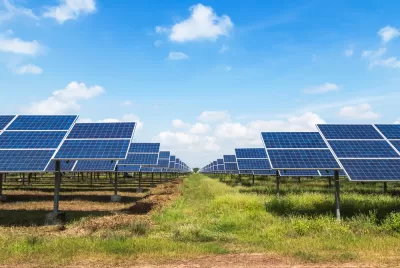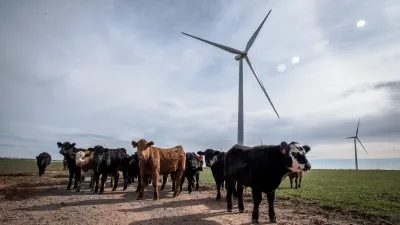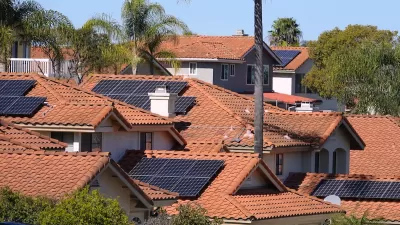A bevy of real and unfounded claims against solar farms is feeding a growing opposition movement in rural areas.

"Solar farms require huge amounts of land, and there’s a fast-growing movement, fueled by politicized social-media campaigns, to prevent solar developers from permitting new sites in rural America," reports Nichola Groom. "Solar currently makes up 3% of U.S. electricity supply and could reach 45% by 2050 to meet the Biden administration’s goals to eliminate or offset emissions by 2050, according to the Department of Energy. To get there, the U.S. solar industry needs a land area twice the size of Massachusetts, according to DOE."
Unlike the first big projects, located in remote, unpopulated areas, "tensions are rising as the sector plans bigger projects and reaches into more populated rural areas unfamiliar with solar." Now, "As solar developers propose new, often sprawling projects in places like Kansas, Maine, Texas, Virginia and elsewhere, local governments and activist groups are seeking to block them and often succeeding. They cite reasons ranging from aesthetics that would harm property values to fears about health and safety, and loss of arable land, farm culture, or wildlife habitat."
The article details the opposition groups, formed and organized primarily via Facebook, that lead efforts to stop large-scale solar projects using an array of real and false claims. While landowners are attracted by the high prices offered by solar companies, "It’s a harder sell to communities as a whole, which often see little economic upside to offset the downsides of large installations, which often create only one or two full-time jobs."
"Local pushback could delay plans by utilities to retire aging coal plants and replace them with solar projects to appease climate-conscious investors and regulators." Solar energy proponents are working to change public perception and address local concerns. "New Jersey, for instance, became a major market for solar despite the state’s dense development, primarily by putting projects on landfills or other disturbed land. And Minnesota has voluntary standards that encourage establishing pollinator-friendly vegetation at solar sites to reduce environmental opposition."
FULL STORY: Special Report: U.S. solar expansion stalled by rural land-use protests

Maui's Vacation Rental Debate Turns Ugly
Verbal attacks, misinformation campaigns and fistfights plague a high-stakes debate to convert thousands of vacation rentals into long-term housing.

Planetizen Federal Action Tracker
A weekly monitor of how Trump’s orders and actions are impacting planners and planning in America.

San Francisco Suspends Traffic Calming Amidst Record Deaths
Citing “a challenging fiscal landscape,” the city will cease the program on the heels of 42 traffic deaths, including 24 pedestrians.

Defunct Pittsburgh Power Plant to Become Residential Tower
A decommissioned steam heat plant will be redeveloped into almost 100 affordable housing units.

Trump Prompts Restructuring of Transportation Research Board in “Unprecedented Overreach”
The TRB has eliminated more than half of its committees including those focused on climate, equity, and cities.

Amtrak Rolls Out New Orleans to Alabama “Mardi Gras” Train
The new service will operate morning and evening departures between Mobile and New Orleans.
Urban Design for Planners 1: Software Tools
This six-course series explores essential urban design concepts using open source software and equips planners with the tools they need to participate fully in the urban design process.
Planning for Universal Design
Learn the tools for implementing Universal Design in planning regulations.
Heyer Gruel & Associates PA
JM Goldson LLC
Custer County Colorado
City of Camden Redevelopment Agency
City of Astoria
Transportation Research & Education Center (TREC) at Portland State University
Jefferson Parish Government
Camden Redevelopment Agency
City of Claremont





























